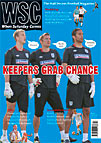 John Chapman looks back on a highly successful season for Anderlecht
John Chapman looks back on a highly successful season for Anderlecht
The long-term significance
This season was a highwater mark in Belgian football. Not only did Anderlecht retain the championship but they also reached the second group stage of the Champions League. In the decade since, no Belgian team has achieved anything like that in Europe. Unfortunately, success was a double-edged sword, as an exodus of players led to Anderlecht losing their way. Only recently are the club beginning to return to 2000-01 levels. Further down the table, promoted Antwerp finished 12th in the first of their two seasons in the top flight – this was the peak of their collaboration with Manchester United. The Old Trafford hierarchy had expected much more.
Story of the season
Anderlecht had lost veterans Enzo Scifo and Par Zetterberg, to Sporting Charleroi and Olympiakos respectively. This gave an opportunity to young hopefuls, such as Romanian fan favourite Alin Stoica and Walter Baseggio. Though these players certainly played their part this season, their careers never really flourished.
Club Brugge had lost full-back Eric Deflandre to Lyon but otherwise relied on a squad that was typified by combative Belgian stalwart Gert Verheyen. Brugge started the season like a train, winning their first 14 matches. Coached by Norwegian Trond Sollied, they only lost once in the first half of the season – to Anderlecht. At the winter break, Belgium’s “big two” were locked together on 48 points – 14 points ahead of third-placed Standard Liège. Anderlecht were unbeaten at that stage, with Bart Goor, Jan Koller and Tomasz Radzinski performing well in both domestic and Champions League encounters. Anderlecht’s high spot was a home win over Manchester United, after which many thought the players would lose interest in the league and focus on the Champions League, or rather on its potential “shop window”.
That didn’t happen and Anderlecht only lost once, to Gent on March 17. Club Brugge then blew their chances by drawing at home to Eendracht Aalst on the following day. In the end, Les Mauves won the league by five points. After being in the spotlight, Koller, Radzinski, Goor and Didier Dheedene secured big-money deals. All moved to the Bundesliga except for Radzinski who arrived in the Premier League with Everton.
For the record books
Radzinski finished the season as leading scorer with 23 goals, one ahead of Koller. Excelsior Mouscron’s Serbian striker Nenad Jestrovic was third on 20 and joined Anderlecht the following season. Koller was named Player of the Year ahead of team-mates Yves Vanderhaeghe and Baseggio. This was Anderlecht’s first clean sweep at the awards since 1965.
Same place today
The Jupiler League has now been reduced to 16 teams. Of the 18 clubs from this season, 12 are still in the First Division. Of those, Lierse and KV Mechelen have had spells in the second tier.
Moved furthest away
Mouscron were declared bankrupt and expelled from the First Division midway through the 2009-10 season and their future is currently uncertain. In 2001 Harelbeke merged with Ingelmunster to become Sporting West Ingelmunster-Harelbeke, and in 2009 La Louvière merged with Sportif Coulet to form FC La Louvière. Both new clubs now play in the provincial leagues.
From WSC 281 July 2010